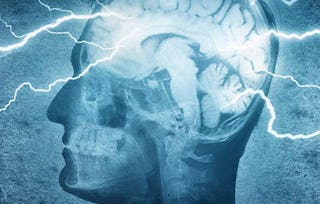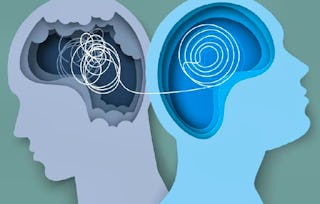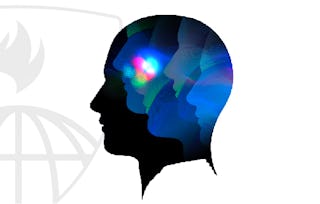Depressive and bipolar disorders are estimated to affect more than 400 million people around the globe. Although treatments are available, most people who are affected by these disorders are not properly diagnosed or treated. This course provides a review of common depressive and bipolar disorders, including dysthymic disorder, premenstrual dysphoric disorder, peripartum depressive disorder, as well as bipolar type I disorder, bipolar type II disorder, and cyclothymic disorder. In addition, the course presents the diagnostic criteria, demographics, contributing factors, and treatments for each disorder.

Depressive and Bipolar Disorders
6 days left! Gain next-level skills with Coursera Plus for $199 (regularly $399). Save now.

Depressive and Bipolar Disorders
This course is part of multiple programs.

Instructor: Kyle Smith
8,522 already enrolled
Included with
(71 reviews)
Recommended experience
Skills you'll gain
Details to know

Add to your LinkedIn profile
33 assignments
See how employees at top companies are mastering in-demand skills

Build your subject-matter expertise
- Learn new concepts from industry experts
- Gain a foundational understanding of a subject or tool
- Develop job-relevant skills with hands-on projects
- Earn a shareable career certificate

There are 11 modules in this course
This module introduces you to your PsycLearn Essentials course. Find out what’s included in this course and how to navigate the modules and lessons. You’ll also learn valuable study tips for successful learning.
What's included
1 video7 readings
Depressive and bipolar disorders are types of mood disorders. Though they are different in many ways, the major symptom of depressive and bipolar disorders is altered mood.
What's included
1 video8 readings3 assignments
Diagnostic criteria and worldwide prevalence for depressive and bipolar disorders are discussed.
What's included
7 readings3 assignments
Biological contributing factors, such as genetics, epigenetics, and neurobiological factors, for depressive and bipolar disorders are discussed.
What's included
4 videos9 readings3 assignments
Psychological contributing factors, such as helplessness and hopelessness, and environmental conditions, such as childhood trauma, poverty, prejudice, and discrimination, are discussed for depressive and bipolar disorders.
What's included
3 readings3 assignments
Biological, such as pharmacotherapy and brain stimulation, and psychological, such as cognitive-behavioral therapy, treatments for depressive and bipolar disorders are discussed. This module also explores integrated approaches that combine biological and psychological treatments.
What's included
10 readings3 assignments
Demographics, risk factors, and preventive treatments for depressive and bipolar disorders are discussed.
What's included
1 video11 readings3 assignments
This final content module brings all of the previous course material together and gives you material to review and questions for you to use to assess your learning.
What's included
27 readings14 assignments
This module contains a cumulative quiz.
What's included
1 assignment
This module contains a glossary, course references and a list of contributors to the course.
What's included
3 readings
This module provides a variety of information and tools from the American Psychological Association (APA) that will help inspire you as you complete your coursework and plan your career goals. Explore APA resources on various psychological issues and scholarly research and writing; a list of sites providing valuable resources on diversity, equity, and inclusion in psychology education and in the professional community; resources on a career in psychology; and links to career opportunities at the APA.
What's included
8 readings
Earn a career certificate
Add this credential to your LinkedIn profile, resume, or CV. Share it on social media and in your performance review.
Instructor

Offered by
Explore more from Psychology
 Status: Free Trial
Status: Free TrialAmerican Psychological Association
 Status: Free Trial
Status: Free Trial Status: Free Trial
Status: Free TrialAmerican Psychological Association
 Status: Preview
Status: PreviewJohns Hopkins University
Why people choose Coursera for their career

Felipe M.

Jennifer J.

Larry W.

Chaitanya A.
Learner reviews
- 5 stars
84.50%
- 4 stars
15.49%
- 3 stars
0%
- 2 stars
0%
- 1 star
0%
Showing 3 of 71
Reviewed on Nov 30, 2024
superbly crafted and insightful for all students devoted to the discipline of psychology.
Reviewed on Dec 11, 2024
the course neglects a little the priority of psychotherapy in general and other psychological therapies like psychodynamic therapy
Reviewed on Mar 29, 2025
I really enjoyed this class, a lot of information presented in a wonderful manner.
Frequently asked questions
To access the course materials, assignments and to earn a Certificate, you will need to purchase the Certificate experience when you enroll in a course. You can try a Free Trial instead, or apply for Financial Aid. The course may offer 'Full Course, No Certificate' instead. This option lets you see all course materials, submit required assessments, and get a final grade. This also means that you will not be able to purchase a Certificate experience.
When you enroll in the course, you get access to all of the courses in the Specialization, and you earn a certificate when you complete the work. Your electronic Certificate will be added to your Accomplishments page - from there, you can print your Certificate or add it to your LinkedIn profile.
Yes. In select learning programs, you can apply for financial aid or a scholarship if you can’t afford the enrollment fee. If fin aid or scholarship is available for your learning program selection, you’ll find a link to apply on the description page.
More questions
Financial aid available,





